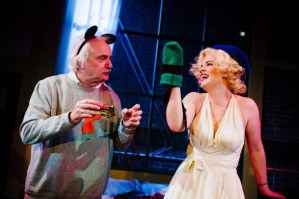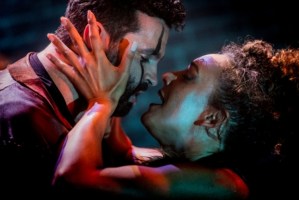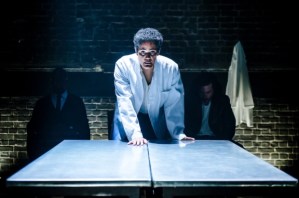Review: #Hashtag Lightie (Arcola Theatre)
Lynette Linton’s play returns after a sell-out run earlier this year
Like her protagonist, teenage beauty vlogger Ella, Lynette Linton’s family drama is "claiming a place for the mixed-race face". Back at the Arcola after a sold-out run in February, #Hashtag Lightie offers a concise and comprehensive overview of the identity issues born of having dual-heritage. The four close-knit Irish-Barbadian siblings face racism from one side, and shadism from the other. Being mixed-race starts to seem like a minefield – and it’s one that’s all too often overlooked.
While Ella’s online make-up tips for light-skinned women fast accrue a fandom, she bears the brunt of a backlash too. For every video response praising her beauty, there’s another trolling her for denigrating dark skin. Adele James captures the confusion of a teenager in too deep, so that the more vociferously she calls out her haters, the uglier Ella starts to seem.
On its own, Ella’s story is a potent little fable about the dangers of online appearances and the fetishisation of light skin, not least by a fashion industry that makes mixed-race models the acceptable face of blackness.
But Linton wrings an impressive array of identity issues from a single family. Ella’s eldest sister Melissa (Grace-Cookey Gam) is pushing a memoir about growing up mixed-race, falling between boxes on census forms and never quite fitting in, on her white partner, David, a publisher who "only dates black women". Her other sister Aimee (Sophia Leonie) is marrying a black man on the quick, in part on account of superficial attraction. Their respective lifestyle choices – their mannerisms and interests – question the way we project racial identities onto people. As one of Ella’s trolls puts it, "when a mixed-race girl chooses her man, she picks her side".
The play’s point is that mixed-race men and women are uniquely positioned by having to pick at all. Each has to navigate a minefield of identity issues, facing prejudices from both sides. Light enough to attract envy over apparent privileges, they still face their share of racial abuse and aggression. Ella’s brother Aaron, frequently prevented from picking his pale-faced daughter up from school, carries an old injury from an assault in Ireland – his family home.
Linton skilfully threads theory through the action, nodding to eugenicist Marie Stopes' notion of "the horror of being neither black nor white" and understandings of racial identity as a social construct. These are ideas all too rarely given space, and they fit neatly into a play that’s wary of the increasing dominance of image over words in contemporary culture, not least online.
However, for all that #Hashtag Lightie is an important, nuanced play, it is not a great one. Rather than letting issues simmer out of character’s lives, Linton skips to the dramatic flashpoints. There are the makings of a great, slow-burning family drama here, but instead, condensed into 75 minutes, Rikki Beadle-Blair‘s production seems soapish and frantic. It makes for a bitty, fragmented play, a story told in snapshots. It mirrors the rhythms of online culture and quickfire YouTube clips, but it’s nonetheless unsatisfying and unconvincing onstage.
Hashtag Lightie runs at the Arcola until 30 November.















